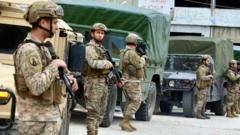**The ceasefire, originally set to expire, has been extended to ensure further negotiations regarding security and the return of prisoners.**
**Ceasefire Agreement Extended in Lebanon Amid Renewed Tensions**

**Ceasefire Agreement Extended in Lebanon Amid Renewed Tensions**
**Lebanon's truce with Israel pushed to mid-February, as casualties mount and concerns rise over Hezbollah's presence.**
The ongoing conflict dynamics in Lebanon have led to the extension of a ceasefire agreement between Lebanon and Israel, initially set to expire on Sunday. The new deadline extends the truce until mid-February, as reported by the U.S. and Lebanese officials. The extension arrives amid accusations from Israel that Lebanon has not adequately enforced the ceasefire terms, particularly concerning the removal of Hezbollah militants from bordering regions.
Lebanon's Prime Minister Najib Mikati announced the revised ceasefire date following communications with the U.S., emphasizing the urgent need for stability amid growing tensions. This adjustment comes on the heels of a tragic incident, as the Lebanese health ministry reported that Israeli forces killed 22 individuals and wounded 124 who were attempting to return home in southern Lebanon.
The ceasefire agreement, brokered by the U.S. and France and announced in late November, was intended to conclude 14 months of sustained conflict between Israel and Hezbollah, which escalated last September. The original plan mandated Hezbollah to cease its military presence in southern Lebanon over a 60-day period while establishing a framework for Israeli troop withdrawal. The goal was a permanent end to hostilities, underscored by former President Joe Biden's assurance of long-term peace.
However, Israel's announcement just before the ceasefire's initial expiration indicated that troops would remain deployed in the region, reinforcing the view that the Lebanese government had not fulfilled its responsibilities. The U.S. has reiterated its commitment to support both Israel and Lebanon through ongoing negotiations, including discussions regarding Lebanese prisoners captured during hostilities that began on October 7, 2023.
The conflict has already resulted in significant human suffering, with around 4,000 lives lost in Lebanon, predominantly among civilians, and over 1.2 million people displaced. Despite some Lebanese citizens returning to their homes near the border, officials warn that the area remains precarious.
Israel cited security concerns, stating its military fired "warning shots" and detained individuals perceived as threats, further exacerbating tensions. The broader implications of this extended ceasefire echo the complexities of Lebanese internal politics, marked by Hezbollah’s ties to Iranian influence and the historical context of its military interactions with Israel.
As negotiations proceed, the focus will likely remain on achieving lasting security arrangements, rebuilding trust, and determining the fate of detained individuals on both sides.





















